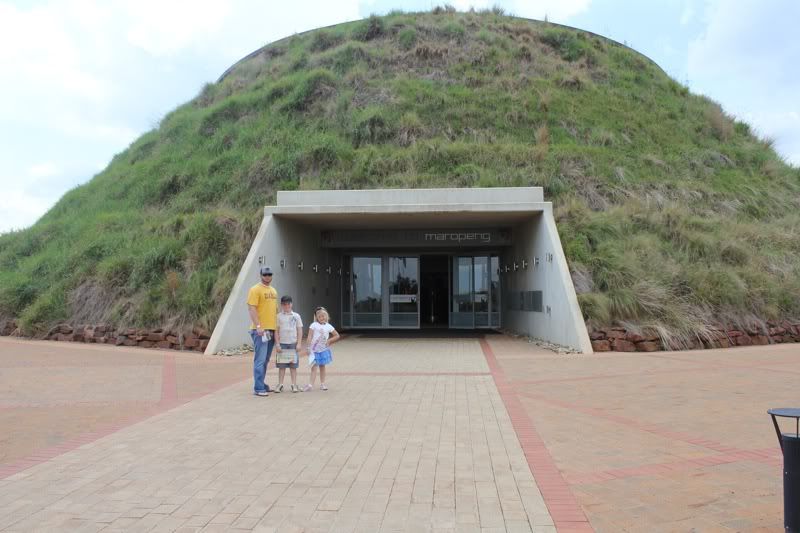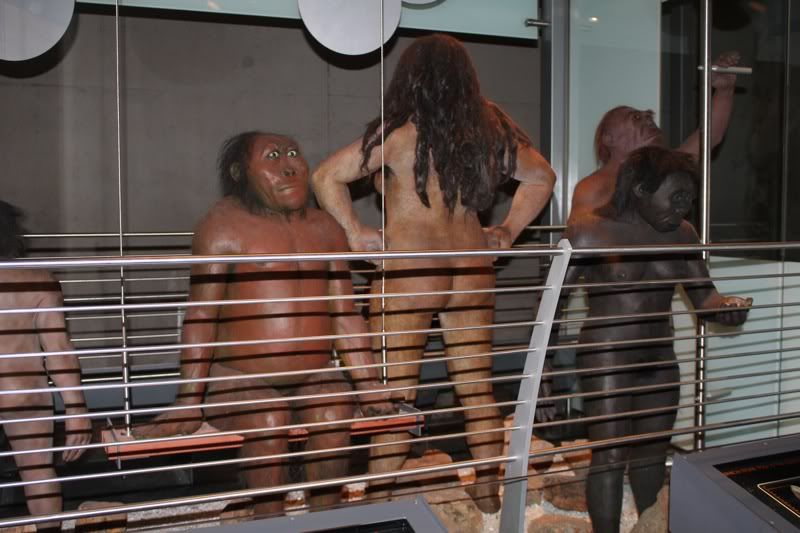 Trent finally had a day off and we decided we better make the most of it and go somewhere new. We are so fortunate to be able to live here and take every chance we get to tour this incredible country. It is nearly impossible to see everything you want to see while on a typical vacation but after a year long holiday we have no excuses not to see it all!
Trent finally had a day off and we decided we better make the most of it and go somewhere new. We are so fortunate to be able to live here and take every chance we get to tour this incredible country. It is nearly impossible to see everything you want to see while on a typical vacation but after a year long holiday we have no excuses not to see it all!One of the tourist hot spots we had yet to visit was the Cradle of Humankind. It is a "World Heritage Site" which I learned is a list of 910 cultural and natural properties throughout the world that are considered to have universal value. While there are caves to visit also, we only made it to Maropeng (meaning "place of origin") which is a museum exhibiting the development of humans and our ancestors over the past few million years. The kids loved looking at the fossils which include "Mrs. Ples" who was discovered in the area and lived more than 2 million years ago.
 She is said to be one of our earliest related ancestors. Her skull is very small (the shape of a chimpanzee) but scientists confirm that "she" stood upright. "The discovery of the historical skull at Sterkfontein provided irrefutable proof of the existence of ape-men and the origins of human existence in Africa"(southafrica.net, Mrs. Ples). I wanted Aiden to stand next to the models of our early relatives but he was too disturbed by the fact that they were nude (it didn't bother him that they looked like monkeys, however).
She is said to be one of our earliest related ancestors. Her skull is very small (the shape of a chimpanzee) but scientists confirm that "she" stood upright. "The discovery of the historical skull at Sterkfontein provided irrefutable proof of the existence of ape-men and the origins of human existence in Africa"(southafrica.net, Mrs. Ples). I wanted Aiden to stand next to the models of our early relatives but he was too disturbed by the fact that they were nude (it didn't bother him that they looked like monkeys, however). One of the messages I found interesting:
- The universe was formed about 14-billion years ago. The Earth is about 4.6-billion years old.
- Life first emerged about 3.8-billion years ago. Our journey begins in South Africa, where fossils of some of the earliest known life forms on Earth have been found.
- All of humanity shares an African heritage. We are one, diverse species across the globe, with our roots in Africa.
My favorite part of the museum was the area that showed the characteristics that make humans unique (i.e. development of jaw and diet, development and growth of the brain, living with others, etc.). My favorite section, of course, was the "development of language". This is something we all take for granted but we are the only creatures with the proper anatomy and ability to speak. There is some debate as when this ability occurred; whether is was with the homo habilis 2 million years ago or only with modern homo sapiens 200, 000 years ago. Either way, we are extra-ordinary creatures, aren't we? Other advanced animal groups are known to have some methods of basic communication but nothing can compare to our complex system of sounds and symbols, which allows us to express ideas, thoughts and feelings!
In this same area was the characteristic of sustainability. This was one of the most thought provoking sections for me as it discussed our impact on the earth and the fact that we as humans are "developing unequally". I found this quote on the Maropeng Visitor website:
"At first, we humans barely made an impact on the environment. But this has changed, as our technological abilities have progressed. Now our activities are causing serious implications for our planet, including the unusually fast extinction of species and global warming.
And we humans have developed very unequally. While the northern hemisphere is generally rich, the southern hemisphere is generally poor. Wealth is unevenly spread. A person who has HIV/AIDS in Africa is more likely to die quickly from the disease because they do not have access to drugs than a person in the USA, for example, where it has become a manageable disease. As our population grows, there is ever-more competition for precious resources for our sustainability as a species such as water and land.
Ouch, huh? On the wall of the museum was a world wide statistics about the percentage of individuals that can read by age 15. For example, The USA was 97%, Japan 99%, South Africa 86%, Uganda 70%, Mozambique 44%, and Niger 28%. (This statistic was in 2005 so I believe the statistics may presently be higher?). I stood there speechless and depressed, as I thought about how unfair it is that education is based on economy, therefore completely unequal. I see that so clearly here in South Africa. I know that there are far worse off countries, but seeing as this is the only "3rd world country" I have lived in, I am shocked by the inequality of education based on income. There is not a day that goes by that I don't look into the eyes of some of the most beautiful people I have ever met and wonder if they had had a chance at a better education or a higher education what could they have become? I think that is why I have such a difficult time here with the "hawkers", beggars, and guys handing out fliers on the street corner for $2.00 a day. I am less bothered by the discomfort I feel by their need and persistence every time I pull up to a street light, as I am about the fact that this is all they can do to survive. These are not individuals who have the ability to get a better job, as they lack the qualifications. This is not a job they are doing to earn money while they continue their education towards a career, this is their career. Every time I see one of these individuals I think of the children I have the privilege to work with at Aurora. I pray everyday that these beautiful little people will have the opportunity to complete their schooling and go to college. I hope that money is not the deciding factor that prohibits them from gaining all the knowledge and skill they need to be whatever they want to be.
The last statement in the quote above "Now that we can do anything, what will we do?" is the same thing that I struggle with each and every day. Where do we possibly begin. How can we as single individuals make the greatest impact. I think so many of us feel that we need to contribute most to those closest to home but as I have been reminded, by my trip to the museum, we are all one species just spread out across the globe. At times (okay almost all the time) I am still overwhelmed by who I should be helping. But I have found that through the power of prayer and listening to the promptings of the spirit that we can truly know what our role is here on earth. I feel an overwhelming sense of obligation to give all I can to these beautiful children in this country right now. I know that my time here is coming to a close so I worry everyday that I won't be ready to go and I am not sure I can leave the children I care so much about. This is not the first time I have become overly attached to children I was working with. As a speech therapist in the schools I worried about the difference I was making every single day. A friend then said to me, "you are a chapter in these children's life not the whole book". I know that applies to the children I am working with at Aurora...I just hope I am a dang good chapter!


No comments:
Post a Comment